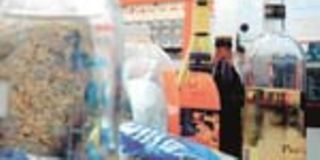New rules for importers

The lethal methanol drink that killed more than 50 revellers in Machakos two weeks ago lies in two jars at the Kenya Bureau of Standards laboratories in South C, Nairobi yesterday awaiting tests. The bureau announced that in future imported goods must be tested in their countries of origin.

The lethal methanol drink that killed more than 50 revellers in Machakos two weeks ago lies in two jars at the Kenya Bureau of Standards laboratories in South C, Nairobi yesterday awaiting tests. The bureau announced that in future imported goods must be tested in their countries of origin.
Photo by George Mulala
Imports will soon be inspected at their countries of origin to ensure they meet Kenyan standards.
Kenya Bureau of Standards managing director, John Masila, said the government will announce a tender for external agents who will be accredited to inspect the goods in various countries around the world.
The importers will be issued with a quality compliance certificate by a laboratory agent certified by the bureau.
Following the expiry of the pre-shipment inspection services on June 30, 2005, Kebs took over the role of verification of imports with respect to quality.
Before the expiry, inspection services were offered by Bivac International and Cotecna Inspection SA, who were contracted by the Government to offer the services three years ago.
"Under the WTO rules, it is the responsibility of the exporting country to ensure that the exported goods meet the importing country's quality requirements," said Mr Masila.
Mr Masila said he expects the process to run smoothly as imports would be inspected outside Kenya.
"We do not necessarily need to undertake inspection of the same goods before releasing if they are inspected by a reliable organisation abroad," Mr Masila told reporters yesterday at his Nairobi office.
He said the bureau is to invest Sh1.5 billion in the next three years to modernise its laboratories. The project is expected to be fully operational by September this year, Mr Masila said.
There was concern that the new requirement might lead to importers hiking price of goods to recoup money spent on obtaining of test certificates. However, Mr Masila allayed the fears, noting that it is the responsibility of the exporter to demonstrate that his product meets the standard requirements of the importing country.
"Hence, the exporter should meet the cost of proving that indeed his product is of the right quality," he said.




